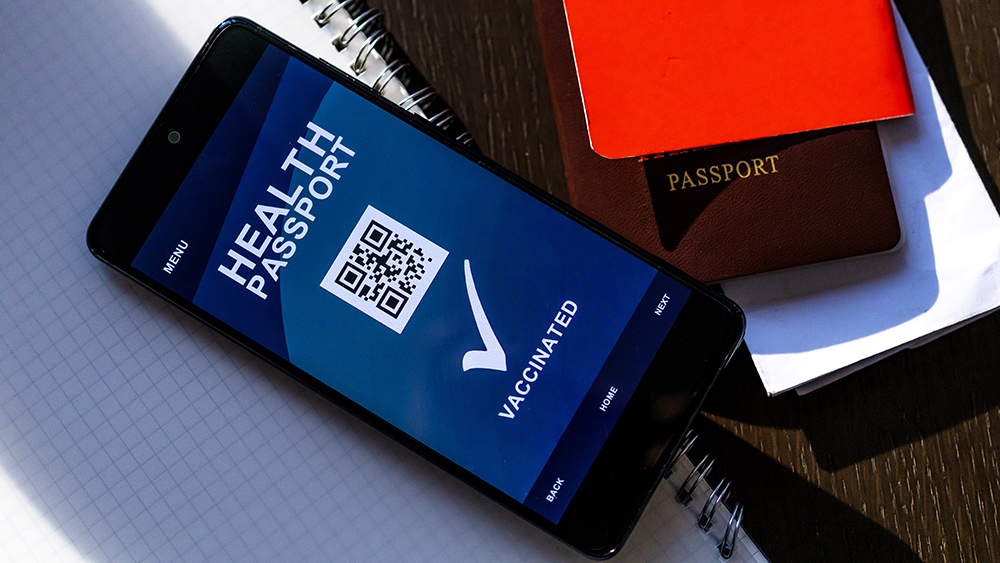Israel passes law mandating new arriving passengers wear TRACKING BRACELETS during quarantine period
03/19/2021 / By Arsenio Toledo

The Israeli parliament just passed a law mandating that all arrivals to the state wear electronic tracking bracelets while undergoing mandatory Wuhan coronavirus (COVID-19) quarantines at home.
The legislation allows the government to force all new arrivals from abroad or from specific countries to choose between quarantining at home or in a state-run hotel. Quarantine exemptions will be provided for “special humanitarian cases” and for children under 14. (Related: Extended coronavirus lockdowns having severe negative effect on mental health of children – report.)
Those who choose to quarantine at home must wear electronic tracking bracelets to ensure their compliance. People who refuse to wear the bracelets will be forced to quarantine at a state-run hotel for two weeks.
Bracelet’s handlers claim it will not violate personal privacy
“The bracelet will monitor the wearers’ location via Bluetooth and GPS technology and connect to the users’ cell phone,” reads a press release from the Knesset, Israel’s parliament. “The bracelet monitor will notify authorities should they violate the mandatory isolation period.”
If people are not able to get an exemption on the basis of age or special humanitarian cases, they will be allowed to present proof that they have been vaccinated against the coronavirus.
Alternatively, they can present a medical note stating that they were previously infected with the coronavirus and have since recovered. People who qualify under this requirement will be released from the quarantine requirement following a mandatory blood test.
According to the bill, the tracking operation will be carried out by SuperCom, a private company hired by the Israeli Ministry of Health. The information collected by the operation will be stored in servers owned by the government but maintained by designated private corporations.
The data collected will supposedly be deleted at the end of the quarantine period – as long as there are no reported infractions – or in no longer than 30 days.
According to SuperCom president and CEO Ordan Trabelsi, the bracelet cannot monitor any details about the person wearing it other than to determine whether the person is complying with quarantine rules.
If a person wearing a tracking bracelet violates quarantine, the device will not be used to locate the person. Instead, SuperCom will alert the authorities who will take over the case.
The bill’s passage comes right after Israel conducted a pilot program involving the electronic monitoring bracelets. In early March, 100 new arrivals at Ben Gurion Airport in Tel Aviv were presented with the bracelets as an alternative to spending two weeks at a state-run hotel. If they agreed to wear the bracelets, they would be allowed to spend quarantine at home or in another designated location.
On March 5, SuperCom said the trial program was successful.
“We are very pleased with this pilot, utilizing our proprietary technology with persons under home quarantine in Israel,” said Trabelsi. “And we are proud to help Israel validate an important strategy to help mitigate the spread of the coronavirus.”
According to SuperCom, the participants of the program expressed “very positive and comfortable experiences with a high rate of satisfaction for choosing the program.”
Passage of new quarantine bill was very contentious
The controversial legislation was passed by the Knesset on Wednesday, March 17. Because of the contentiousness of the law, only five of the Knesset’s 120-members voted on the bill. Four of the parliamentarians present voted in favor, while one voted against.
Adherents of the bill believe it to be an essential tool in stepping up the Middle Eastern country’s quarantine enforcement. Police officers and other relevant authorities have described it as necessary in order to allow Israel’s borders to reopen, at least to its citizens.
But critics of the bill, including the lone member of the Knesset who voted against it, believe that the bill violates a person’s right to privacy.
While the bill was being debated in the Knesset, the country’s Supreme Court ruled that the government-imposed regulation limiting the number of Israeli citizens who can return to the country to 3,000 per day must be rolled back. Furthermore, the court canceled the order that citizens who are vaccinated and wish to leave the country, including children, must obtain permission from a special government committee.
According to the Supreme Court, both of these regulations will be canceled effective on Sunday, March 21 and cannot be renewed.
Despite this ruling, local media outlets reported that government officials met on Wednesday to try to find a solution to maintain some kind of limit on the freedom of movement of visitors and Israeli citizens. These officials are concerned that the new and supposedly more dangerous variants of the coronavirus will enter the country.
The Israeli government is considering tightening restrictions on the freedom of movement despite the fact that the COVID-19 outbreak in the country is improving. The number of serious coronavirus cases in the country has dropped below 600 for the first time since December.
According to the latest figures, there were 578 active patients in severe condition, of whom 263 were critical and 214 were intubated. On Tuesday, 1,538 people contracted the coronavirus, marking another significant decrease from the 2,108 cases that were identified on Monday and the 2,416 cases identified last Thursday.
The positive rate has also dropped to its lowest level since December, at 2.1 percent. Furthermore, the reproduction rate, the number that measures how many people each positive coronavirus case infects on average, dropped to its lowest level in months at 0.7.
Even though the situation in Israel is improving, the Military Intelligence Directorate warned the public against relaxing and urged people to continue wearing masks and following social distancing protocols.
Learn more about how governments are using the coronavirus pandemic to expand their surveillance apparatuses by reading the latest articles at Pandemic.news.
Sources include:
Tagged Under: badtech, coronavirus, covid-19, health freedom, Israel, loss of privacy, Medical Tyranny, Orwellian, pandemic, police state, privacy, quarantine, spying, surveillance, surveillance state, tracking bracelet
RECENT NEWS & ARTICLES
COPYRIGHT © 2017 OBEY NEWS




















